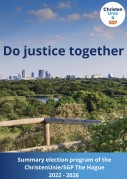Strengthen the manufacturing industry. It is important that factory workers can find work in the city. The council is therefore committed to supporting the manufacturing industry, ensuring there is sufficient space in the city for these companies and maintaining the Binckhorst.
Space for rest. More is not always better. It is good for entrepreneurs and employees in The Hague to have a moment of rest in our hectic 24-hour economy. We will therefore take a critical look at the (extension of) shopping hours and limit them if necessary. Business owners and their staff, including market stall owners, should always be able to choose not to work on Sundays.
Room for business. The entrepreneur progresses his business, and the council facilitates this. For all questions you can contact a single council desk. The entrepreneur portal will be further strengthened in terms of accessibility and available knowledge. The council will also apply a 'zero balance' for new rules for companies. For every new line, an old one has to be removed. In this way we ensure that it remains easy to do business in The Hague.
The City brand is supportive, not defining. The Hague is the city of sand and peat, where the Prime Minister cycles to his office, while the residents of The Hague peruse the world news together in the cafe. A city that promotes itself and where the brand follows. The budget for city branding may be reduced by the Christenunie/SGP. In addition, there will be no additional hotels.
The port is and will remain a port. Our city has only one port and we must cherish it. In recent years, expansion has been carried out in Scheveningen harbour where houses and a hotel have been added. We support no more new buildings, no hotels, pop museum or casinos being added to the port. Instead, more space will be reserved for port-related activities and the current quay space will be preserved.
Work for tradespeople. The council is making extra efforts in sectors that provide employment for the low- and medium-skilled, such as construction, greenery, logistics and transport and care. For example, the council initiates information meetings for, among others, young people, status holders and mature students.
City-wide approach to poverty. The ChristenUnie/SGP advocates a city-wide approach in which the council works together with social organizations and funds in the city to take joint action. We can achieve more when we join forces and have clear goals in mind.
Help victims of the allowance scandal. The council will continue to offer help to the parents affected by the allowance scandal (toeslagenaffaire), also in the long term. They actively seek contact with the parents and provide support with the problems that have arisen.
Addressing debt. The council must, where possible, literally and figuratively sit beside people to help them properly. The barriers to receiving help from the council will be made as low as possible and investments will be made into the expertise and skills of the council advisors. Finally, we invest in freedom of choice: just as you can choose your own doctor’s surgery, a person requesting help can select which instancy they wish to work with and can always ask for a second opinion.

